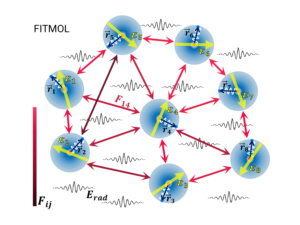The project at a glance
-
Start date:01 Dec 2022
-
Duration in months:64
-
Funding:European Research Council
-
Principal Investigator(s):Alexandre Tkatchenko
About
The quantum-mechanical (QM) theory of molecular interactions is firmly established, however its applicability to large molecular systems is hindered by the extreme computational cost required to achieve high accuracy. Painstaking QM calculations based on coupled-cluster (CC) theory and/or the quantum Monte Carlo (QMC) method can reach an accuracy of 1 kJ/mol per molecule consisting of a few dozen atoms. For several important classes of molecular systems, the much more efficient semilocal density-functional theory (DFT) including nonlocal many-body dispersion interactions can achieve similar predictive accuracy as CC or QMC methods when compared to experimental data. However, DFT methods are routinely applicable to systems with only 100-1000 atoms. The premise of FITMOL is that as a community we need to move beyond particle-based Hamiltonians to a field-theory (FIT) approach in order to solve the conundrum of simultaneously predictive, efficient, and insightful quantum simulations of large ensembles of molecules. To extend the applicability of quantum mechanics to functional molecules with millions of atoms, it is critical to develop robust FIT approaches for molecular interactions subject to internal, external, and vacuum fields. The main focus is on pioneering FIT/QED methods including both electronic and nuclear QM fluctuations to model complex molecular systems. This challenging goal will be accomplished by unifying concepts and combining techniques from FIT, many-body physics, quantum chemistry, DFT, statistical mechanics, and machine learning. The TCP (theoretical chemical physics) group of Prof. Alexandre Tkatchenko is uniquely positioned to achieve this breakthrough, as demonstrated substantial expertise in developing efficient and accurate methods for electronic correlations, nuclear quantum effects, multiscale methods combining microscopic QM and macroscopic continuum methods, employing machine learning. The developments will result in simultaneously accurate and efficient methods as powerful tools for understanding coupled matter-field quantum correlations with the capacity for predictive modeling of large realistic systems.
Organisation and Partners
- Department of Physics and Materials Science
- Faculty of Science, Technology and Medicine (FSTM)
- Theoretical Chemical Physics
Project team
-
Alexandre Tkatchenko
More about Quantum
Keywords
- Quantum chemistry
- Quantum electrodynamics
- Quantum field theory
- (Bio)molecules
